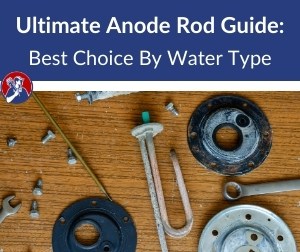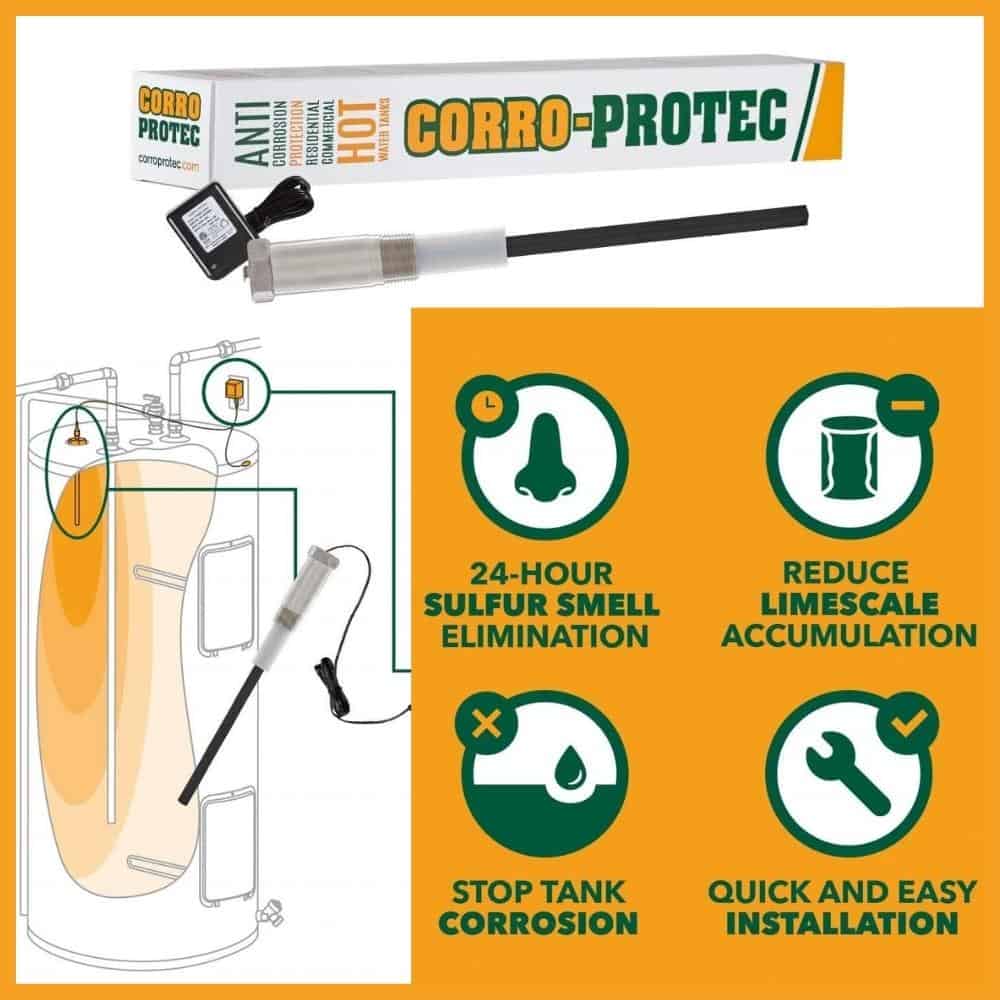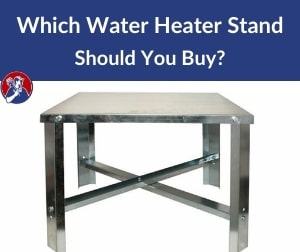
Do you need to buy a replacement anode rod for your water heater, but don’t know what type will work best with your home’s water? The anode rod you buy can have a significant impact on your water heater’s lifespan and the quality of water it provides.
Anode rods prevent the natural process of corrosion in your tank-type water heater. You can choose a sacrificial metal anode rod or a powered anode rod.
Sacrificial metal anode rods are made from aluminum or magnesium. All options have different strengths and weaknesses that make them preferred in different conditions.
In this PlumbingNav guide, we will cover:
- What are the different types of anode rods?
- What type of anode rod works best for hard water? Soft water? Well water?
- What should you look for in an anode rod?
- Top five anode rod reviews
| Image | Product | |||
|---|---|---|---|---|
Best Multi-Purpose  | Best Multi-Purpose | Water Connection AR136 Aluminum Zinc Anode Rod
|
| View on Amazon |
Best Hard Water  | Best Hard Water | Rheem AP12938 42” Anode Rod
|
| View on Amazon |
Best Well Water  | Best Well Water | EAU 44″ Aluminum Zinc Anode Rod
|
| View on Amazon |
Best Soft Water  | Best Soft Water | Kelaro 44” Magnesium Water Heater Anode Rod
|
| View on Amazon |
Good Option  | Good Option | Corro-Protec CP-R Water Heater Powered Titanium Anode Rod
|
| View on Amazon |
Our Overall #1 Rated Pick
Updated On February 13, 2026
Our #1 Rated Pick: Water Connection AR136 Aluminum Zinc Anode Rod
This 44” aluminum and zinc anode rod protects your water heater tank when you have both hard water or water that smells like rotten eggs.
After an easy installation process due to the standard size and design, you will notice better smelling water in as little as 24 – 48 hours. It will also protect the tank for up to 3 years.
Get Fast, Local Plumbing Service
Connect with an expert plumber in your local area to tackle any job – big or small. Find help with leaks, clogs, or full installations.
Select your service category on the form, provide your details, and an expert plumber will be in touch!
Plumbing Navigator is an informational site that connects visitors with local plumbers but does not directly provide plumbing services or operate as a licensed company.
Top Anode Rods for Hard, Softened, and Well Water Types
Need an anode rod in a hurry? See our top five anode rods for different water types to solve the problem now and learn about the topic more in-depth later.
- Water Connection AR136 Aluminum Zinc Anode Rod (Best Multi-Purpose)
- Rheem AP12938 42” Anode Rod (Best Hard Water)
- EAU 44″ Aluminum Zinc Anode Rod (Best Well Water)
- Kelaro 44” Magnesium Water Heater Anode Rod (Best Soft Water)
- Corro-Protec CP-R Water Heater Powered Titanium Anode Rod (Good Option)
| What's In This Guide? | |
|---|---|
|
|
|
What Are The Different Types Of Anode Rods?
You have the option to choose between two different sacrificial metal anode rods: aluminum and magnesium. You also have the option to select a powered anode rod.
Sacrificial Anode Rods
Sacrificial anode rods account for a large majority of anode rods. They work by using a highly cursive metal to attract corrosion to the rod instead of the tank – thus, sacrificing themselves. You need to check the rod annually and replace it when the item becomes fully corroded.
- Aluminum Anode Rods
Aluminum anode rods either come made entirely out of aluminum or, more often, a combination of aluminum and zinc. These anode rods cost the least, and they last longer than magnesium rods. However, they don’t prevent corrosion as well as magnesium anode rods, especially at the end of their lifespan. When combined with zinc, the product will eliminate any rotten egg smell coming from your water heater.
- Magnesium Anode Rods
Magnesium rods cost more than aluminum anode rods and need replacement more often, but they protect the tank more thoroughly than aluminum rods, making up for the cost by extending the life of the water heater.
Powered Anode Rods
Powered anode rods use an electrical current to prevent corrosion. This means they don’t corrode and require replacement regularly, like sacrificial metal anode rods. In fact, some powered anode rods can last for decades.
Powered anode rods require electricity and cost far more than sacrificial anode rods, but they also last significantly longer and don’t require much maintenance.
As a big bonus, they get rid of any sulfur smell coming from your water heater, too! This one is a GREAT option. They cost more up front, but prolong the life of your unit. They come with a 20-year warranty.

What Is The Best Anode Rod For Hard Water?
Aluminum/zinc anode rods work best for hard water.
Most water that enters your home contains a concentration of minerals, such as calcium. Hard water refers to water with 120 parts per million (ppm) or more organic material in it. Hard water accelerates corrosion and leaves deposits in your water heater tank, which can damage internal components.
Aluminum anode rods possess higher corrosive levels than magnesium anode rods, and magnesium anode rods can’t provide the proper effects necessary when in contact with hard water.
With that stated, a water softener at your main water line can reduce the number of minerals in the water, making a magnesium anode rod appropriate.
What Is The Best Anode Rod For Well Water?
Aluminum/zinc anode rods work best for well water.
Some people prefer the taste of well water or prefer not to use the water from the city, so they bring water into their home from a well on their property. Homeowners who get water from a well won’t see a water bill, and they have control over the quality of the water.
Well water contents vary based on your location, but well water tends to contain high levels of minerals. This makes aluminum the best option for your water heater in most cases. However, well water also comes with an unpleasant smell, which the zinc manages.
You also have the option to install a water softener at your well’s main water line. If you do this, you can enjoy the benefits of a magnesium anode rod.
What Is The Best Anode Rod For Softened Water?
Magnesium anode rods and powered anode rods work best for softened water.
Soft water can still cause corrosion but at a decelerated rate that a magnesium anode rod can properly handle. Your magnesium anode rod will keep the tank free from corrosion until you need to replace it, and it will keep your water healthy.
Unfortunately, too much aluminum in your drinking water can make it undesirable or even unsafe to drink. Magnesium, on the other hand, doesn’t contaminate water and may even provide additional health benefits.
Aluminum anode rods can get the job done if you don’t plan on drinking the water, but the tank won’t last as long.

What Do You Look For In The Best Anode Rod For Your Water Heater?
Once you choose which type of anode rod you want, additional considerations include the size of the anode rod and flexibility.
Size
You want an anode rod long enough to reach all the way down the length of your water heater to get the best results and avoid replacing the anode rod more often than necessary. Be careful not to buy an anode rod designed for an RV or trailer if you require something larger.
To get the appropriately sized anode rod, find your water heater’s user manual to get the length of the tank or measure it with a tape measure. Choose an anode rod the same height as your tank. The standard size for most water heaters is 44”, but if you get a taller anode rod, you can cut it to size.
Flexibility
Tanks and anode rods get quite tall. This makes them difficult to work with. Luckily, many companies make anode rods that come in multiple, flexible sections.
Replacing Your Anode Rod (Video Tutorial)
Now that you have a new anode rod, it’s time to install it. Watch the video below to learn how to replace your anode rod yourself.
Best Anode Rods by Water Type Reviewed
We found the best anode rods with great reviews currently on the market that cover a wide range of situations. See our review of the five best anode rods for home water heaters.
Our #1 Rated Pick: Water Connection AR136 Aluminum Zinc Anode Rod
This 44” aluminum and zinc anode rod protects your water heater tank when you have both hard water or water that smells like rotten eggs.
After an easy installation process due to the standard size and design, you will notice better smelling water in as little as 24 – 48 hours. It will also protect the tank for up to 3 years.
Pros
- Works well for hard water and well water
- Protects your water heater for up to 3 years
- Easy installation
Cons
- Not segmented
- Not best for soft water
- Hex-head only
Our #2 Rated Pick: Rheem AP12938 42” Anode Rod
Made by the trusted Rheem brand, this 42” aluminum anode rod with a diameter of .625” can use its corrosive properties to prevent damage to your water heater tank. The anode rod comes in one sturdy piece, making it slightly more difficult to install than flexible options.
Pros
- Perfect for hard water
- Slightly smaller than standard options
- Lasts longer than magnesium
Cons
- No zinc
- No tape or tools included
- More difficult installation
Our #3 Rated Pick: EAU 44″ Aluminum Zinc Anode Rod
This 44” aluminum and zinc anode rod comes in 12” flexible sections and standard ¾” thread to make it easy for you to install. This product can handle heavy demands from hard well water thanks to the aluminum. And it eliminates any sulfur smell common in well water, thanks to the zinc.
Pros
- Can handle hard water
- Lasts longer than magnesium
- Includes socket tool and tape
Cons
- Won’t prolong life of tank as long
- Magnetic properties can cause slight issues
- Possible health concerns of aluminum
Our #4 Rated Pick: Kelaro 44” Magnesium Water Heater Anode Rod
This 44” anode rod comes in a flexible design that only requires 12” of headway above the water heater to install it, and it uses the common ¾” thread that fits most water heaters. Made of magnesium, it provides excellent results in soft water conditions, but you must replace it as needed (check it every year).
Pros
- Prolong life of tank for soft water
- Flexible design for easy installation
- Universal size and connections
Cons
- Not recommended for hard water
- No tape included
- Does not remove rotten egg smell
Our #5 Rated Pick: Corro-Protec CP-R Water Heater Powered Titanium Anode Rod
This titanium-powered anode rod fits inside 40 – 89 gallon tanks to eliminate foul odor and effectively prevent corrosion of your water heater tank. This product usually costs 3 – 4 times more than sacrificial anode rods, but it comes with a 20-year warranty.
After you follow the simple installation and power the device, you will notice a difference by the next day.
Pros
- 20-year warranty
- Fits multiple tanks
- Noticeably high effectiveness
Cons
- Expensive
- Requires electricity
- No tape included
Final Thoughts On Choosing the Right Anode Rod
If you have a tank-style water heater, you need to check the anode rod every year and replace it as required to ensure that your tank stays protected from corrosion.
Before picking an anode rod, learn more about your water. If you have hard water, you should use an aluminum or aluminum/zinc anode rod since the more effective magnesium anode rods won’t provide the desired results with hard water.
If you have soft water or buy a water softener, you can use magnesium anode rods that keep tanks protected for longer and don’t impair the quality of the water in any way, making it safe to drink.
For homeowners who plan to stay in their current home for several years, you should consider a powered anode rod. These anode rods can provide protection for all types of water and last up to 20 years with little maintenance. However, they require a nearby power source and cost substantially more upfront.
Get Fast, Local Plumbing Service
Connect with an expert plumber in your local area to tackle any job – big or small. Find help with leaks, clogs, or full installations.
Select your service category on the form, provide your details, and an expert plumber will be in touch!
Plumbing Navigator is an informational site that connects visitors with local plumbers but does not directly provide plumbing services or operate as a licensed company.
FAQs on Choosing the Best Anode Rod By Water Type
Are anode rods all the same?
No. The material and size make a big difference in the product’s performance, so examine the details of your purchase properly before finalizing the transaction.
Sacrificial anode rods come in various materials, and certain materials work best when submerged in either hard water, soft water, or well water. You can also get a powered anode rod.
Pick the best type of anode rod for the water you have at your home:
- Magnesium – soft water
- Aluminum – hard water
- Aluminum/zinc – well water
- Powered – all types of water
How do I choose the right anode rod?
When you pick an anode rod, ensure you get the right length and diameter for your tank. You also want to consider flexibility if you don’t have much space above the water heater to install the new component conveniently.
Do I need an anode rod if I have a water softener?
Yes. While a water softener will help keep your water heater tank free from corrosion for longer, it doesn’t halt the process all together. You will still need an anode rod (we suggest magnesium in this situation).
What is the best anode rod for well water?
Aluminum/zinc anode rods come with the corrosive capabilities to protect your water heater properly from the hard water usually found in wells. The zinc will keep the water smelling fresh, even when well water doesn’t start that way.
Which is better: a magnesium or an aluminum anode rod?
Magnesium anode rods produce better results when it comes to protecting the tank, but they don’t have the corrosive powers to handle hard water as aluminum does.
Are powered anode rods worth it?
Powered anode rods pay for themselves in time since they don’t require a replacement for up to 20 years. However, this only benefits you if you plan to stay in your home that long.
How do I know what size anode rod I need?
Look at your water heater’s user manual to get the height of the tank and anode rod diameter. Alternatively, you can search for anode rods that advertise as compatible with your brand of water heater.
Related Post:
Looking to conserve hot water, and save money? See this post on the best water heater timer switch:
Meet Your Plumbing Navigator

About Plumbing Navigator
We’re passionate about all things plumbing, and love sharing tips, “how-to”, and reviewing the latest products to help make your project a success!
Learn More Plumbing Tips
Want to tackle more plumbing projects? Check out these helpful guides!






